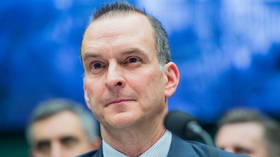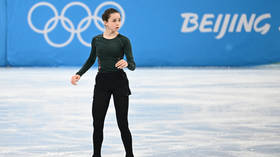US could prosecute Russians involved in Valieva doping case – report

The head of the US Anti Doping Agency (USADA) has fiercely criticized the "Russian state system" and said that those involved in Winter Olympics figure skating star Kamila Valieva’s doping case could be prosecuted under the American Rodchenkov Act (RADA).
The act, which was signed into US law in 2020, gives American prosecutors the power to seek fines of up to $1 million and jail terms of up to 10 years for actions affecting American athletes' results in a bill that can be applied to non-Americans.
15-year-old Valieva produced a stunning performance to help the Russian Olympic Committee (ROC) win gold in the team figure skating event at the Beijing Games on Monday, only for the IOC to call off the medal ceremony because of an unspecified legal issue.
The International Testing Agency (ITA) said on Friday that Valieva, who is favorite to win the singles competition next week, had failed a drug test taken at the national championships in St Petersburg on December 25.
"The act has been used to protect one Olympic Games," USADA boss Travis Tygart told Reuters, referring to the 2020 Tokyo Games which took place in 2021.
"It is going to be used to protect other Olympic Games when people continue to dope.
"You cannot make it up. We are living in the twilight zone. Clean athletes deserve better and this poor young woman deserves better.
"She's getting chewed up [for doping] on top of being abused by the Russian state system."
US authorities can use RADA to prosecute individuals for doping incidents at international events featuring American athletes, sponsors or broadcasters.
The act is named after Grigory Rodchenkov, the former head of Russia's main doping control laboratory in Moscow who alleged that a widespread state-run secret campaign was providing athletes with doping and hiding their test results from international inspectors. Russia denied that there ever was such a state-sponsored campaign.
Rodchenkov fled to the US in 2016 and was later charged with running an illegal doping scheme by Russian officials. His allegations led to Russian athletes being banned from numerous major international sporting events.
It is unclear why there was a substantial delay between Valieva's test and the result, which allowed the prodigy to travel to Beijing and take part in the first of her two events despite angina drug trimetazidine being detected in her urine.
The testing lab in Stockholm reported that the banned substance had been found in Valieva's system a day after her first career Olympic gold medal.
"Whoever was dealing with it simply, absolutely should have expedited it," said Tygart.
"It is not that difficult to do. A five-week delay for a substance like this should not have happened.
"It is a catastrophic failure of the system to allow the star of the Games to have her sample not reported back [for] close to five weeks, and then it gets reported the day after they won the team event.
"You shouldn’t be in a government or sport and [be] able to dope athletes and there be no consequence."
Tygart claimed the RADA is "the only way" to tackle "state-sponsored doping" in Russia.
Russian athletes at the Games compete under a neutral flag and the Russian national anthem is not played at ceremonies as part of sanctions under a WADA ruling which is due to be lifted in December 2022.
The International Olympic Committee (IOC) and International Skating Union (ISU) are both challenging the ruling with the Court of Arbitration for Sport (CAS), which is set to hear the case before Valieva is due to compete in the ladies’ singles event in Beijing on Tuesday.
In a statement, the ROC said Valieva had repeatedly passed doping tests at her triumphant European Figure Skating Championships in January and during the Beijing Games.
"The Russian Olympic Committee shall take comprehensive measures in order to protect the rights and interests of the members of the ROC Team and to preserve the honestly-won Olympic gold medal," it said, adding that Valieva retains the right to train and compete "to the fullest extent without restrictions".
A spokesperson for the US Olympic and Paralympic Committee said: "For us, this is less about medals and more about protecting the sanctity of fair and clean sport and holding those accountable that don't uphold the Olympic values.
"We don't have any comment beyond that but will let you know if that changes."















